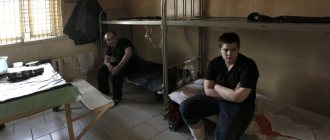Preliminary isolation of a subject who is accused of committing a criminal act is a rather difficult test for most prisoners, due to the large number of restrictions that cannot be compared with being in a colony or other form of imprisonment. Strict conditions and a minimum of freedoms are unique ways of putting pressure on those under investigation, for some of whom the relaxation of conditions and the opportunity to remain in a pre-trial detention center as an economic worker become the reason for cooperation with the investigation.
The conditions of detention in a pre-trial detention center, differentiated for different age and gender categories of prisoners, are a test of the will of the person under investigation, and one or more of the cellmates may well turn out to be accomplices of law enforcement agencies.
What are the conditions of detention for women and men in pre-trial detention centers?
Admission procedure
The detention center operates around the clock, including the reception of newly arrived prisoners, who are subject to a thorough personal search, including internal cavities used to bring prohibited substances and objects inside the perimeter of the pre-trial detention center. The belongings of new arrivals are also subject to a thorough search, and if there is a suspicion that foreign objects are hidden inside clothes or shoes, they can be ripped open and examined from the inside.
The admission procedure involves taking the fingerprints of the new prisoner, photographing him and interviewing him for compliance with the accompanying records and available documents. After the acceptance procedures, the prisoner is sent to a cell selected depending on the following parameters:
- by gender, since the coexistence of prisoners of opposite sexes is unacceptable;
- according to age criteria, due to the need for separate detention of adolescents under the supervision of one adult prisoner cooperating with the administration;
- according to the degree of danger of those under investigation, since separate detention is provided for those sentenced to lifelong isolation;
- according to the number of inmates, due to the fact that inmates who find themselves in a pre-trial detention center again or repeatedly are required to be kept separately from those arrested for the first time;
- accomplices in the same case or overlapping processes cannot be placed in the same cell or adjacent rooms in order to exclude the possibility of communications.
The standard area for each inmate in a pre-trial detention center is set at 4 m2, but in fact it barely reaches 2.5 m2, due to overcrowding in the isolation wards and the unsuitable condition of some of the premises.
The video below will tell you about the conditions of detention in one of the pre-trial detention centers in Russia:
Cameras
The cells of the pre-trial detention center are equipped with the required number of sleeping and seating places, and incoming prisoners are provided with bedding and the minimum necessary hygiene products. Getting up in the pre-trial detention center is provided at 6 o'clock in the morning, and this is indicated by a sound signal, after which lying on the bunks is not allowed until lights out at 10 o'clock in the evening.
Persons confined within the perimeter of the pre-trial detention center are forced to spend almost all of their time in cells, with the exception of:
- daily walks, conventionally carried out in the open air, with which the walking area communicates through a ceiling in the form of a mesh or lattice;
- weekly 15-minute water treatments in the shower or bath;
- periodic visits to a lawyer and/or defense counsel;
- on-site investigative activities, including confrontations, identifications and investigative experiments.
Knowing about the conditions of serving a sentence in a pre-trial detention center, let’s talk about the rules and procedures for detention here before trial.
How to file a complaint about the conditions of detention in a pre-trial detention center?
If a person who finds himself in a pre-trial detention center is not satisfied with the conditions of his detention, he believes that his rights are being violated, then he can always file a complaint, setting out his reasons.
How to file a complaint against a pre-trial detention center, temporary detention center or other type of detention center?
The complaint is drawn up in free form, indicating the general necessary details:
- To whom the complaint is addressed;
- From whom the complaint is made;
- The name of the relevant statement, for example, “the complaint is not about improper conditions of detention in the pre-trial detention center”;
- Statement of factual circumstances;
- What the person asks from the addressee;
- Date and signature.
Complaints addressed to certain authorities are not subject to censorship. Such complaints should be submitted under a mark on your copy.
USEFUL : see more tips on filing a complaint and write your question to the lawyer in the comments of the video for advice
Rules and routine
So, the internal regulations of pre-trial detention centers.
- Monitoring compliance with the stay regime and rules for storing prohibited items is implemented in the pre-trial detention center through periodic inspection of cells, sleeping places, furniture and household items. Such checks are always organized spontaneously, so that inmates do not have time to get rid of phones and other prohibited items or transport them to another cell.
- Half an hour after getting up, the prisoners will receive breakfast, which, along with lunch and dinner, will consist of first and second courses and tea. The nutritional value and taste of prison gruel leave much to be desired, and for prisoners with weak stomachs it can become a real challenge. Obvious contraindications against the standard diet may be the basis for obtaining a more dietary diet, including eggs, dairy products, chicken and beef.
- From 8 to 9 a.m. in the pre-trial detention center there is a change of shifts of guards, who walk around the cells as part of the handing over and receiving shifts, in order to inspect and collect complaints and suggestions from prisoners, including about living conditions, the electrical system and communications.
- During the day, prisoners can play board games, provided to inmates along with other mandatory items for personal and public use, and also spend time reading books or writing letters, which at the end of the day can be handed over to the inspectors of the detention center in an unsealed form for censorship.
- After 22 hours, the lighting in the cells is switched to night mode, illuminating the cells with dim light, in which a flurry of activity begins in the exchange of messages via the prison “telegraph”, as well as the transfer of various items, drugs and money. Illegal activity subsides closer to dawn, shortly before the signal to rise.
Next, we will consider a list of diseases that prevent detention in a pre-trial detention center according to the law.
The following video will tell you more about how best to behave in a pre-trial detention center:
How to survive in a pre-trial detention center: a memo from Team 29 lawyers
In 2022, the Federal Penitentiary Service reported that a special area of the service’s work is “ensuring standards for the treatment of prisoners and convicts,” as well as ensuring their right to medical care. However, the latest news proves the groundlessness of these statements: for example, a 55-year-old businessman accused of fraud lost 48 kilograms in a pre-trial detention center, but a Moscow court refused to transfer him to a prison hospital; businessman Valery Pshenichny died in a pre-trial detention center - lawyers are sure that he was tortured, raped, and then strangled.
Despite the fact that there are people in pre-trial detention centers who have not yet been found guilty, the conditions in the detention centers most often cannot be called anything other than inhumane - this was stated by experts during the discussion of the June amendments to the Criminal Code.
Lawyers and lawyers of “Team 29”, together with their client Sahib Aliyev, who has been in a pre-trial detention center for a year, have prepared a memo on how to behave correctly once in the penitentiary system. “Takiye Dela” publishes the full text of the material with the permission of the project team.
What happens when detained? Is there a chance to have time to pack my things?
Depends on those who are detaining and their intentions. If the goal is to suppress and scare, then the detention will be harsh, it is unlikely that you will be able to collect your things. If you find the right people, everything will go smoothly.
Law enforcement officers are sometimes understanding and allow people to gather, but often the arrest does not take place at home. Then the relatives need to have time to hand over the things before a preventive measure is chosen.
How to communicate with those who are detained?
Be calm. Try to insist that your lawyer be present at all events. Don’t do anything, don’t sign any papers, don’t rush to testify until you fully understand the essence of what is happening. At the beginning of a business, it is easy to make a rash step.
It is useless to argue and swear during detention; it is unlikely to bring the desired result. But you shouldn’t allow your rights to be violated: at a minimum, you can enter information about any violations into the protocol and appeal.
Where do those detained before the trial for the selection of a preventive measure sit?
Immediately after arrest, they are sent to an investigator, after which they may be sent to a police department, a temporary detention center (IVS) or a pre-trial detention center.
When will you be able to contact your family? Will they be able to transfer things?
Relatives can transfer things and food through the investigator, give them to the guard at the trial when choosing a preventive measure, or transfer them to the temporary detention facility. Most often, before the trial, the detainee is kept in a temporary detention center, where a lawyer can meet with him.
Before the trial, all communication is possible only with the permission of the investigator. He can give you his phone number; by law you have the right to one phone call.
What will happen at the first trial to elect a measure?
The trial for the selection of the measure usually takes place on the second day after the arrest. At the meeting, they will consider the investigator’s petition, who will ask the court to choose detention in custody as a preventive measure. Most likely, the court will not refuse.
A lawyer must be present at the trial, but by this time not everyone has time to find one, so they often assign an appointed lawyer. After the court's decision, the detainee is taken under escort to a pre-trial detention center.
When can I meet with a lawyer? What should I tell him?
You can meet with a lawyer before the trial, with the investigator or in the temporary detention facility. The lawyer, as a rule, comes to the pre-trial detention center himself. It is difficult to call him, since there are no means of communication other than letters. The lawyer cannot come often: there are queues in the pre-trial detention center. The defender can stand for a whole day and not get to his client.
A conversation with a lawyer is not regulated. She goes one on one. Detention center and law enforcement officers do not audio record this conversation. The lawyer can record the conversation in any way he likes. Conversation time is limited to working hours.
What's happening in the chamber? How many people are there? How to communicate? Is it true what they say “on a hairdryer”?
The cell can accommodate from two to 200-300 people. Most often 4-8 people sit. The law prohibits keeping “first movers”—those who are sitting for the first time—in a cell with “second movers,” this is usually observed.
But “first-timers” to a pre-trial detention center can also behave strangely: someone starts talking “in a hair dryer”, someone starts to inculcate some kind of thieves’ concepts. It all depends on the camera: if normal people are caught, then everything is as if they were free. If they are rich, they may start to trick you into talking about your criminal case.
Team 29’s client Sahib Aliyev advises not to interfere in another person’s business. You can find out what the article is and what the point is, but nothing more. You can tell something about yourself, but there are no rules that say you have to reveal your business in detail. You can always help: someone with things, someone with advice. But we must remember that sometimes kindness can be mistaken for weakness. In any case, be careful, as you may be put with someone who will “work with you”, trying to persuade you, for example, to confess and agree with everything that is in the case, even if it is not true.
They can easily be transferred to another cell: just like that, in an attempt to influence the defendant, because of his cellmates. Translations are usually explained in general terms.
How often do they come with checks?
Every morning everyone is taken out and checked for injuries. If operatives suspect that there is something prohibited in the cell, checks can be carried out several times a day, and in emergency cases - at night.
What can you do in the cell? What kind of entertainment?
Most of the time you are left to your own devices. You can stay in a pre-trial detention center for a month, a year or more, and it is within your power to spend this time profitably. This is a great opportunity to read a lot of good books and get your body in order with training. Usually there is a library in the isolation ward. It is better to find out how it works in a specific insulator. It’s better to immediately develop a daily routine for yourself and stick to it. The cell usually has a radio and sometimes a television.
In the cell they threaten violence. Where to complain?
Officially - to anyone, for example, the administration of the pre-trial detention center. However, you may be transferred to another cell, where they will already be aware that you “snitched” to the administration, and it is unlikely that your conditions will change for the better.
How can they put pressure on you in a pre-trial detention center?
There is no point in pre-trial detention center employees putting pressure on you if you do not have a personal conflict with them. Usually pressure is applied at the unofficial request of investigators or detectives; to use slang, you can be “frozen” or pressed. The usual way is to transfer you to a cell with terrible conditions, bedbugs, rats, water from the ceiling. Another option is to send you to a cell with people with tuberculosis or other contagious diseases. By law, you cannot be assigned to such a cell, but the management of the pre-trial detention center may simply not mark these people as sick. You may also be placed in a so-called press hut, where other prisoners will exert moral and physical pressure on you.
What will be the violation of internal regulations?
For serious violations, they can be placed in a punishment cell for up to 15 days, the conditions there are worse. You get up at five in the morning, the bed is fastened to the wall and unfastened at 9 in the evening before lights out. There may be a small table and something like a stool.
For minor violations there may be nothing, it all depends on the detention center. For the same violation, in one pre-trial detention center they will be reprimanded or locked in a punishment cell, while in another they will be reprimanded or not paid any attention at all.
If something prohibited, like a telephone, is found in a cell, it can be resettled.
What to do if you are sick or feel unwell?
You need to knock on the cell door, shout to the police officer (the pre-trial detention center employee who is on duty in the corridor - “on the police”) and demand a doctor. Longitudinal may call a doctor, or he may not, the doctor may not come. You can write a petition addressed to the head of the pre-trial detention center and describe the symptoms.
At Kresty, during the morning check-in, you can announce that you are sick, and they will sign you up. How soon the doctor will come is a completely different story, so you can once again politely remind yourself.
If something is serious, a matter of life and death, then you can make a fuss so that medical assistance is provided urgently. The quality of medical care, of course, depends on the isolation ward. Do not download your license and do not argue with doctors. Everything can always be resolved humanly through communication.
Can only a doctor from the pre-trial detention center examine you, or can another doctor be invited?
If you need a specialist in a certain field, they can invite you. As a rule, no one is called because it is believed that one doctor is enough for everyone.
Transfers - what is possible, what is not, how often? Is there a store?
The Federal Penitentiary Service has lists of prohibited and permitted things that can be transferred and stored, but in each pre-trial detention center it is interpreted differently. Transmitted through a transmission bureau. You need to write what you are conveying and for whom.
Transfers are limited to 30 kilograms per month per person under investigation, so it is better to have someone outside coordinate the transfers. In order not to waste valuable kilograms, you can order some products through the store. More detailed information is available on the FSIN website.
All transmissions are checked, food is cut - bread, meat products. Everything that can be poured, poured and rearranged will have to be poured, poured and rearranged. Perishable products are not always delivered. Cottage cheese is not allowed everywhere, even in buns - it burns well.
Each person under investigation has an account where they can deposit money. This money is used to buy food in the store in the pre-trial detention center.
Communication with the investigator - how often, what happens there, is there always a lawyer present?
An investigator in a pre-trial detention center can call a person under investigation often, but as a rule this happens once every three months. If you want to testify, you can petition to call an investigator, and he will consider this petition.
A lawyer is required to be present at investigative actions, but sometimes the investigator comes just to talk, which is not entirely legal. During such a conversation, you can just sit and not answer them. You can ask that a lawyer be present at the meeting.
Remember: if you are a suspect or accused in a case, testifying is your right, not your obligation. Together with your lawyer, you can decide whether, what, and when to testify. This can be postponed until the case is considered on the merits. Do not rush to testify to the investigator, even if you are sure that you are not guilty of anything.
Operational workers may appear to communicate with you at the direction of the investigator; you can also try to prevent this: write a statement according to the Code of Criminal Procedure of the Russian Federation, according to which such meetings can take place in the presence of a lawyer if the accused requests it.
How is communication with the outside world going?
Officially - through letters. An envelope, paper and pen need to be bought at the pre-trial detention center store, or they can be transferred from outside. You can write emails through the FSIN Internet resource, which is available in almost every pre-trial detention center.
Are they looking at the letters?
Yes, by law your correspondence must be censored. Information that is related to your case will almost certainly not be released to the public.
Are there any other ways to communicate?
There is a saying: “The need for invention is cunning,” so people always find a way to communicate. Most detention centers have telephones; of course, this is all unofficial, but they exist.
A person can have his own phone, or a so-called “common phone”. If your cell does not have a telephone, then you can ask for it in another cell through a window on a rope or through a hole in the wall, ventilation, etc. However, there is a risk of being framed: they hand you a phone, and the pre-trial detention center officers immediately come in, conduct a search, and from the cell from which the phone was handed over, they say that you owe money for that phone - this was planned in advance.
You can also convey the message through a lawyer, or, if you do not have a lawyer by agreement, you can agree with your cellmates who has a lawyer and who can convey the message to relatives. There is also inter-camera communication, which is officially prohibited, but still exists. Usually people shout to each other through windows, ventilation, and exchange notes that are passed using ropes.
Is it possible to meet with family?
Theoretically, yes, but they must be given permission by the investigator. You must write a petition and submit it personally to the investigator during investigative actions or through the administration of the pre-trial detention center. Meetings with family are possible twice a month. Most likely, they will not be allowed, especially if the investigator wants to put additional pressure on you.
If the meeting is nevertheless allowed, it will take place in a special room. You will communicate through glass on the phone, just like in a foreign movie. A prison officer is present at the meeting. He may interrupt the meeting if, for example, you tell your family any information related to your case.
How do they usually take you to court and for investigative actions?
You must be taken to court and for investigative actions by escort. By law, it must consist of police officers, but often it includes FSB officers; they believe that this is legal, although there are doubts.
The car has several single “glasses” and a common bench. More people are getting there. They usually don’t hit cars, but they can accelerate and brake sharply.
They can take you away for the whole day for investigative actions. They may give you a packed lunch for your trip. It's better than the food you usually get at the store.
Where to complain if you think your rights are being violated?
There is a special prosecutor for the observance of rights in places of deprivation of liberty and pre-trial detention centers. However, there is practically no help from him.
You can contact the public monitoring commission, for example, by writing a letter there asking them to come and check. The pre-trial detention center does not have the right not to miss this complaint, but often it does not. You can ask a lawyer to complain about your conditions of detention.
Diseases that prevent detention in an isolation ward
For people with health problems, there is a way to avoid confinement in a detention center if the prison doctor confirms one of the following diseases:
- dangerous infections and parasites;
- tuberculosis in complex forms;
- immunodeficiency, with a secondary disease in the 4th or 5th stage;
- tumors of a malignant nature;
- metabolic disorders and endocrine system defects;
- severe diabetes mellitus and thyroid lesions;
- nervous system, including in the form of atrophy and degenerative forms of the disease;
- impaired motor functions, including paralysis;
- damage to the organs of vision, including complete loss of vision;
- rotting and necrosis, that is, death of tissues and the respiratory system;
- in severe forms of damage to the digestive tract requiring a special diet;
- disorders in the genitourinary system, accompanied by persistent impairment of vital functions;
- injuries and amputations;
- radiation sickness.
Regardless of the disease, in order to use the right to be released from the isolation ward, a medical report will be required, which can only be issued by a commission, and the referral must be issued by the official in charge of the case, that is, an investigator or a judge.
We’ll talk about separate detention regimes in pre-trial detention centers below.
Complaint against the colony administration
The activities of colonies, as well as other institutions and bodies, are monitored by state authorities, courts, departmental control, and prosecutorial supervision.
You can complain about the administration of the colony at
- Federal Penitentiary Service;
- the prosecutor's office;
- court.
Sending a complaint to government authorities is unlikely to entail any action; most likely, a complaint from a person serving a sentence against the colony administration will be directed according to jurisdiction.
Modes
- Usually, prisoners in pre-trial detention centers are kept in common cells, and the most preferential conditions are created for teenagers and women with children.
- Subjects who are characterized negatively and have repeatedly violated the rules of detention in a pre-trial detention center and discipline may be placed in solitary confinement (punishment cells) as a measure of behavior correction.
- Under the general regime of detention, prisoners are not allowed to remain alone in their cells, in particular even when taking a walk or heading to the shower/bath.
- Services for prisoners in the pre-trial detention center are carried out by prisoners who chose to serve their sentences within the perimeter of the detention center, having earned this privilege by cooperating with the administration and the investigation. Such subjects are kept in cells, but during the day they move around within the perimeter without escort, performing housekeeping duties, in particular as food distributors, cleaners, etc.
We will discuss below what a sample complaint about detention in a pre-trial detention center should contain.
Complaint against the pre-trial detention center to the ECHR
Since 1998, our country has had the Convention for the Protection of Human Rights and Fundamental Freedoms (hereinafter referred to as the Convention), which specifies the rights and freedoms of any person. If any rights and freedoms of a particular person are violated by the state through certain bodies, in particular pre-trial detention centers, then you can file a complaint with the ECHR, the purpose of which is to protect the rights reflected in the Convention if they are violated.
An appeal to the said court by persons who find themselves in a pre-trial detention center is not an isolated case for our country; moreover, a complaint about the contents and conditions in a pre-trial detention center is one of the most common. Most often they apply for violations of rights related to torture, inhuman or degrading treatment.
The court can accept a complaint from any individual if his rights proclaimed in the Convention are violated.
BUT: before filing a complaint with the ECHR, a person must take advantage of all domestic remedies, and only then apply to the ECHR within 6 months after the national body makes a final decision.
The complaint must indicate information about the person who files it, as well as information about the results of consideration of complaints by authorized bodies and persons.
If, after considering the case, the ECtHR concludes that the applicant’s rights under the Convention have been violated, the court may award compensation to the victim.
Some legal practitioners and advocates consider appealing to the authorities of the Russian Federation when appealing against any actions or inactions of institutions of the penal system (hereinafter referred to as the penal system) useless, since with a high degree of probability the complaints will be refused, the inspectors will not find violations, and the only hope for justice is the ECHR.
Complaint about conditions
If there are violations of the rights of a prisoner while being kept in a pre-trial detention center, he is authorized to file a complaint about the conditions or attitude of the inspectors by filing a complaint of one of two types:
- Not subject to censorship, including to: the prosecutor's office, the judiciary, the European Court of Human Rights, as well as government authorities and the Commissioner for Human Rights of the Russian Federation.
- Subject to verification by a censor when writing to an authority or organization that does not have the right to check the activities of penitentiary institutions, including detention centers.
In the first case, the message is not opened and must be sent to the addressee within 3 days, and in the second, the envelope is not sealed, and the sending period is extended by the interval necessary for the censor’s work, that is, by another 3 days. The content of the complaint must comply with the requirements for prisoner correspondence and not contain conventional signs, symbols and other signs of secret writing and encryption, as well as data that could complicate the solution of the case, contribute to the commission of a crime, etc.
It is permissible not to send a complaint to a higher authority if it is possible to resolve the issue on the spot, by the administration of the detention center, with the consent of the prisoner. If it is impossible to solve the problem at the local level, the complaint must be registered in the register of outgoing documents and transferred to the addressee, and the answer or resolution must be announced to the prisoner against signature in a journal with the message attached to the prisoner’s personal file.
Even more useful information on the rules in force in pre-trial detention centers is contained in this video:
The Supreme Court ordered a review of the case of poor conditions in the pre-trial detention center and colony
The Supreme Court recalled that complaints about poor conditions in places of detention should be considered according to the rules of administrative proceedings, and the main burden of proof falls on the authorities. This follows from the ruling of the Supreme Court in complaint No. 64-CAD21-4-K9. The man demanded 2 million rubles. compensation for numerous violations of his rights in pre-trial detention centers and colonies, but received only 20,000 rubles.
Background
In 2014, the Yuzhno-Sakhalinsk City Court sentenced Mikhail Fedenko to five years in a general regime colony for robbery (Part 1 of Article 162 of the Criminal Code). After the verdict was passed, he was in a pre-trial detention center from March to November, then he was transferred to a correctional colony. In June 2016, Fedenko was transferred to a settlement colony, and in December 2017 he was released on parole.
- The court ordered compensation of 608,000 rubles for poor conditions in the pre-trial detention center
September 8, 14:07 - The Supreme Court canceled the low compensation for an illegal crime
March 24, 9:20
After this, the man filed a lawsuit seeking compensation for moral damage in the amount of 2 million rubles. According to the plaintiff, conditions in the pre-trial detention center and colony were inadequate. Fedenko said that he was intimidated by the pre-trial detention center staff, there was mold, mice and rats in the cell, and the food was stale. The administration of the detention center opened his correspondence with his lawyer. In addition, he was denied timely dental care. Fedenko was attacked in the colony, but the administration did nothing about it. He was also not allowed to attend his mother's funeral. As another sign of violations of his rights, Fedenko indicated that during the hearing of the case in court, he was kept behind a metal fence.
The Yuzhno-Sakhalinsk City Court denied him compensation. This decision was initially confirmed by the Sakhalin Regional Court, but then the Ninth Court of Cassation of General Jurisdiction overturned the appeal ruling and returned the case for a new trial. For the second time, the Sakhalin Regional Court overturned the decision of the first instance and partially satisfied Fedenko’s demands: it recovered 20,000 rubles from the Ministry of Justice in his favor. The cassation confirmed this decision.
Then Fedenko appealed to the Supreme Court.
Position of the Armed Forces
The Supreme Court recalled that convicted persons have the right to be treated politely by correctional officers and to have their personal safety and health protected. They must not be subjected to cruel and degrading treatment. Correspondence with the defense attorney is not subject to censorship. Due to exceptional circumstances, including the death of a loved one, prisoners may leave the correctional facility for a short period of time.
In this case, the first instance found violations regarding review of correspondence with a lawyer and denial of dental care, but indicated that these actions were not recognized as illegal in the prescribed manner. On the remaining points, the court did not find any violation of Fedenko’s rights. Higher authorities exacted compensation only for checking correspondence and the absence of a dentist, in fact also recognizing the absence of other violations.
- The Federation Council asks the State Duma to approve a ban on cages in courts
March 3, 11:45 - The Ministry of Justice began dismantling cages in courts
November 17, 11:57 - The Commissioner for Human Rights called for the abandonment of cages in courts
July 15, 13:52
The Supreme Court recalled that at the time of consideration of the case, Art. 227.1 CAS, which provides for a special procedure for considering claims for compensation for violation of conditions of detention. Therefore, the appellate instance had to consider the claim, originally filed as a civil one, according to the rules of administrative proceedings. And they imply examination in court of evidence for all stated requirements.
However, the court did not examine the issue of the mother's funeral, denial of protection and detention in a cage during the criminal trial. The appeal did not provide a legal assessment of these circumstances.
In particular, the case file contains the death certificate of Fedenko’s mother, but not his application to the colony administration with a request to leave. There is confirmation of the attack, but the courts have not assessed whether the colony guards were responsible for this. The first instance rejected Fedenko’s request to call witnesses, and the higher courts did not evaluate this.
The Supreme Court also recalled that the ECtHR had previously called not to place an excessive burden of proof on the plaintiff in such cases. He can provide available evidence - a detailed description of the conditions of detention, witness testimony and responses from supervisory authorities. Otherwise, the authorities themselves must prove the absence of violations. This principle was also not applied in the Fedenko case.
The Supreme Court canceled the acts of appeal and cassation regarding the refusal of compensation and sent the case for a new consideration in the appeal according to the rules of administrative proceedings. With regard to the compensation already awarded to Fedenko, the decisions of the lower authorities remain in force.
- Pravo.ru
- Supreme Court of the Russian Federation











